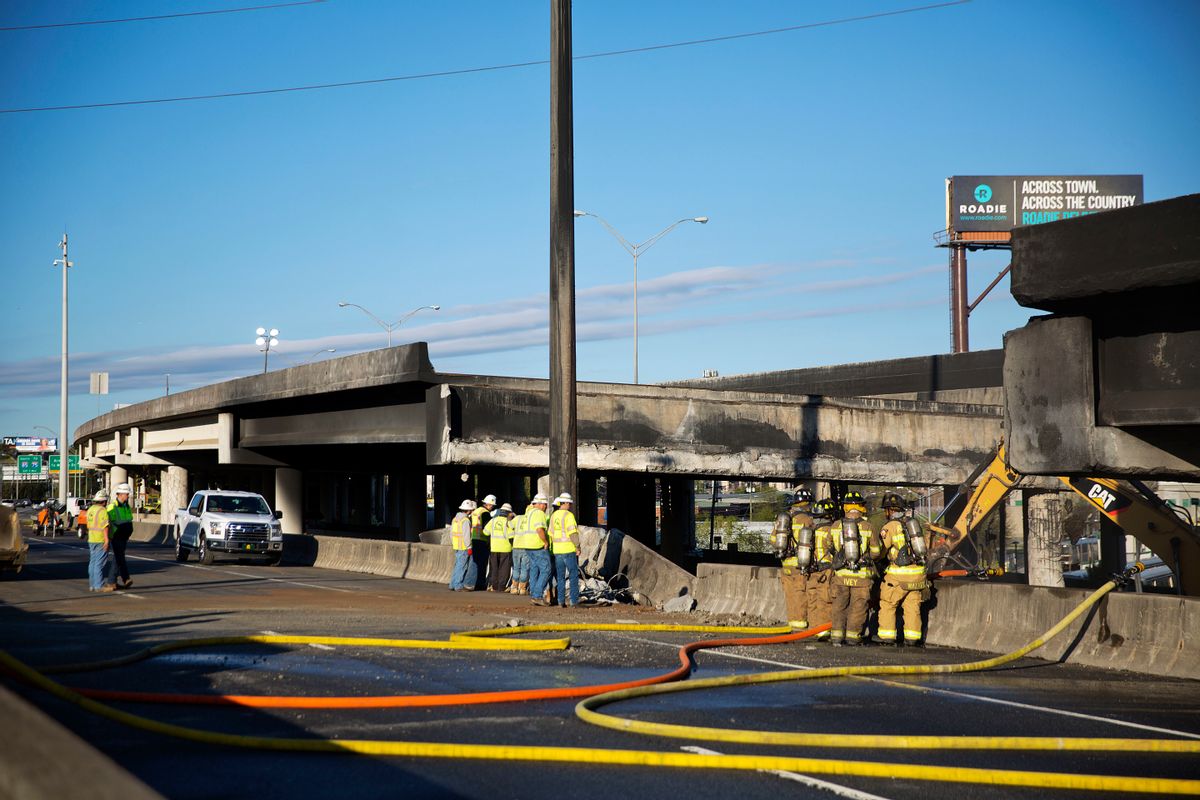On Thursday afternoon, a section of Interstate 85 collapsed after a massive fire burned underneath the structure. The fire is believed to have been started by some PVC materials that caught fire in a car, according to The Associated Press:
The fire burned for more than an hour under I-85 northbound near Piedmont Road, spewing large clouds of black smoke skyward. The interstate — a major artery for the U.S. South that runs through the heart of Atlanta — was closed indefinitely.
The impact on traffic long-term was not immediately known, but traffic was bumper to bumper on nearby surface streets Thursday night as people scrambled to find alternate routes. The Department of Transportation warned all motorists to stay off I-85.
The fire and collapse will be really bad news for car-dependent Atlanta residents, who will have a major artery closed for the foreseeable future, as the AP further noted:
The interstate is a major thoroughfare for traffic heading north and south through Atlanta. The bridge collapse effectively "puts a cork in the bottle," Georgia State Patrol Commissioner Mark McDonough said.
Atlanta's main alternative, its mass transportation system, primarily consists of MARTA — a four-line subway system that runs north to south and east to west through two trunk lines. A plan to expand the subway system gained the support of Georgia voters in November, but that was before President Donald Trump took office. Now, with Trump in the White House, those plans — which rely on federal funding as well — may be in jeopardy, as the Atlanta Journal-Constitution pointed out late last year.
The Atlanta mayor’s bipartisan partnership with Gov. Nathan Deal has worked well for the entire state, particularly in securing federal commitments for the dredging of the Port of Savannah. The mayor has given Georgia entrée to the Obama administration. Deal, a former congressman, has coordinated efforts on the GOP side of the aisle.
It was widely presumed that the alliance would continue into a Hillary Clinton administration, as MARTA began its search for the federal matching funds essential to building, among other things, a rail line to Emory University and the U.S. Centers for Disease Control and Prevention.
But with Trump in the White House, Republicans are no longer in need of a Democrat to serve as ambassador to the executive branch. The underlying political foundation for the Deal-Reed partnership will disappear in January.
That story was written before Trump's inauguration, and when he was still talking about an infrastructure plan. Though the Trump administration is saying an infrastructure package will be presented this year — that's sooner than the 2018 projection Trump proposed months ago — his plan won't actually solve the country's infrastructure problems.
It's also not certain if such a bill could even be passed.
Don't have faith that any Trump-led infrastructure plan would help Atlanta residents the next time a highway collapses — or residents of any city for that matter. As the Atlanta Journal-Constitution noted, the Republican Party platform of 2016 stated that urban planning "subordinates civil engineering to social engineering as it pursues an exclusively urban vision of dense housing and government transit." Instead, the party touted "the longest reauthorization of the Highway Trust Fund."
That trust fund doesn't help much if there's no trust in the highway to begin with.

Shares